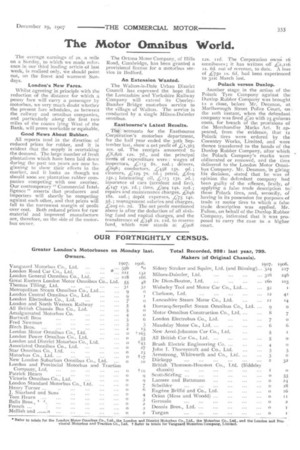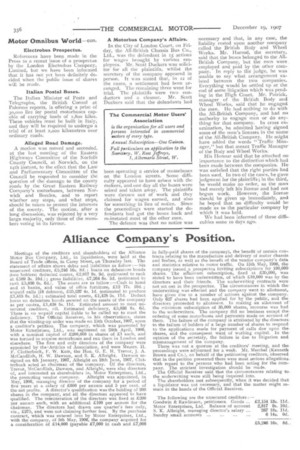The Motor Omnibus World.
Page 7

Page 8

If you've noticed an error in this article please click here to report it so we can fix it.
The average earnings of 2s. a mile on a Sunday, to which we made reference in our third leading article of last week, is realised only, we should point out, on the finest and warmest Sundays.
London's New Fares.
Whilst agreeing in principle with the reduction of the distance for which a penny fare will carry a passenger by motorbus, we very much doubt whether the present fare schedules, as between the railway and omnibus companies, and particularly along the first two miles of the routes lying %Vest of the Bank, will prove workable or equitable.
Good News About Rubber.
All reports tend in the direction of reduced prices for rubber, and it is evident that the supply is overtaking the demand. The large number of fresh plantations which have been laid down during the past ten years are now beginning to show their effects in the market, and it looks as though we should soon see plantation rubber companies competing with one another. Our contemporary " Commercial Intelligence " asserts that producers and importers will shortly be competing against each other, and that prices will fall to the narrowest margin of profit over cost. Both reduced prices for raw material and improved manufacture are, therefore, on the side of the motorbus owner.
The Ortona Motor Company, of Hills Road, Cambridge, has been granted a provisional license for a motorbus service in Bedford.
An Extension Wanted.
The Walton-le-Dale Urban District Council has expressed the hope that the Lancashire and Yorkshire Railway Company will extend its ChorlevBamber Bridge motorbus service to the village of Walton. The service is conducted by a single Milnes-Daimler orn nibus.
Eastbourne's Latest Results.
The accounts for the Eastbourne Corporation's motorbus department, for the half year ended the 3oth September last, show a net profit of .1,363 ins. 9d. The receipts amounted to .4;6,826 12S. 7(1., and the principal iterris of expenditure were : wages of inspectors, Lr Ts 8s. led.; drivers, L*60; conductors, £458 155. 9(1.; cleaners, ..129 75. id.; petrol, £610 155, ; lubricating oil, -1;123 13s. 2d. ; insurance of cars (accident and fire), £147 135. id.; tires, ..904 14s. Iod. ; repairs and maintenance charges, 646 'Ss. Tod.; del:6A expenses, .L-75 I4s. 5d.; management salaries and charges, L2o5 Os. 2d. The net profit mentioned above is after the deduction of all sinking fund and capital charges, and the transference of L'348 Is, lid. to reserve fund, which now stands at L'908
12s. lid. The Corporation owns 16 omnibuses ; it has written off £2,216 IS. 6d. out of revenue, to date. A loss of L'750 is. 6d. had been experienced to 3ist March last.
Polack versus Dunlop.
Another stage in the action. of the Polack Tyre Company against the Dunlop Rubber Company was brought to a close, before Mr. Denman, at Marlborough Street Police Court, on . the loth instant, when the defendant company was fined £20 with 25 guineas costs, for breach of the provisions of the Merchandise Marks Act. It appeared, from the evidence, that 12 Polack tires were ordered by the Coventry Works, Limited, and were thence transferred to the hands of the Dunlop Rubber Company, after which the Polack Company's marks were obliterated or removed, and the tires delivered to the London Motor Omnibus Company. Mr. Denman, in giving his decision, stated that he was of opinion the defendant company had been guilty of the offence, firstly, of applying a false trade description to these Polack tires, and, secondly, of having in its possession for purposes of trade 12 motor tires to which a false trade description was applied. Mr. Fulton, on behalf of the Dunlop Rubber Company, intimated that it was proposed to carry the case to a higher court. Electrobus Prospectus.
References have been made in the Press to a recent issue of a prospectus by the London Electrahus Company, Limited, but we have been informed that it has not yet been definitely decided when the public issue of shares will be made.
Italian Postal Buses.
The Italian Minister of Posts and Telegraphs, the British Consul at Palermo reports, is offering a prize of 30,000 lire for postal motorbuses capable of carrying loads of 1,800 kilos, These vehicles must be built in Italy, and they will be required to undergo a trial of at least 2 ,CKX) kilometres over ordinary roads.
Alleged Road Damage.
A motion was moved and seconded, at the last meeting of the Eastern Highways Committee of the Norfolk County Council, at Norwich, on the hith instant, to the effect that the Law and Parliamentary Committee of the Council be requested to consider the question of the damage to the county roads by the Great Eastern Railway Company's motorbuses, between Norwich and Beimles, and to report whether any steps, and what steps, should be taken to protect the interests of the county. The motion, after a long discussion, was rejected by a very large majority, only three of the members voting in its favour.
A Motorbus Company's Affairs.
In the City of London Court, on Friday, the All-British Chassis Bus Co., Ltd., was the defendant in 15 actions for wages brought by various employees. Mr. Scott Duckers was solicitor for all the plaintiffs, whilst the secretary of the company appeared in person. It was stated that, in 12 of the cases, a settlement had been arranged. The remaining three went for trial. The plaintiffs were two conductors and a cleaner. Mr. Scott Duckers said that the defendants had
been operating a service of motorbuses on the London streets. Some difficulty appeared to have arisen with the makers, and one day all the buses were seized and taken away. The plaintiffs were thrown out of work and they claimed for wages earned, and also for something in lieu of notice. Since the proceedings were started the defendants had got the buses back and re-instated most of the other men.
The defence was that no notice was
necessary and that, in any case, the liability rested upon another company called the British Body and Wheel Works. Mr. Harrod, the secretary, said that the buses belonged to the AllBritish Company, but the men were• employed and paid by the other company. In reply to the judge, he was unable to say what arrangement existed between the two companies. Everything would be settled up at the end of some litigation which was pending in the High Court. Mr. Patrick,. manager of the British Body and Wheel Works, said that he engaged the men. He .had nothing to do with the All-British Company, and had no authority to engage men or do anything for that company. In cross examination, he admitted having signed some of the men's licenses in the name of the All-British Company. He might have added the words "Traffic Manager," but that meant Traffic Manager of the Body and Wheel Works.
His Honour said that he attached no importance to the distinction which had been made between the companies. Hewas satisfied that the right parties had been sued. In two of the cases, he gave judgment for the plaintiffs ; in the third, he would make no order, as the man had merely left his license and had not begun work. However, the license should be given up immediately, and he hoped that no difficulty would be made as to the particular company by which it was held.
We had been informed of these difficulties some to days ago.




















